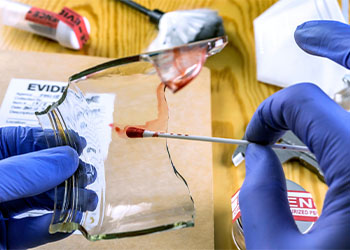Understanding DNA Used as Evidence
Jan. 16, 2024
 The role of DNA evidence is crucial in determining the guilt or innocence of an individual. It's important to have an in-depth understanding of how DNA is collected, preserved, and utilized as evidence in legal proceedings. The aim is to shed light on the effectiveness and accuracy of DNA evidence, as well as its potential use post-conviction, offering valuable insights into the significance of DNA in criminal defense.
The role of DNA evidence is crucial in determining the guilt or innocence of an individual. It's important to have an in-depth understanding of how DNA is collected, preserved, and utilized as evidence in legal proceedings. The aim is to shed light on the effectiveness and accuracy of DNA evidence, as well as its potential use post-conviction, offering valuable insights into the significance of DNA in criminal defense.
Being faced with criminal charges can be an overwhelming experience filled with uncertainty and fear. The complexities of the legal system can be daunting, making it vital to seek guidance from a trusted legal professional. In such situations, we aim to offer clarity and support by providing valuable information about DNA evidence and its role in criminal cases.
Collecting and Preserving DNA
The collection and preservation of DNA evidence require meticulous attention to detail and strict adherence to protocols. This ensures the reliability and admissibility of the evidence in court. Law enforcement agencies and forensic experts employ various methods to obtain DNA samples, such as swabbing surfaces for touch DNA or collecting biological materials like blood or saliva. These samples are carefully packaged, labeled, and stored to maintain their integrity until they are analyzed in a laboratory.
Using DNA as Evidence
DNA evidence has brought about a revolution in criminal investigations and prosecutions. By comparing DNA profiles obtained from crime scenes with those of potential suspects or victims, investigators can establish connections and strengthen their case. DNA evidence can link individuals to a crime scene, identify perpetrators, and even exonerate those wrongfully accused. Its significance in criminal proceedings is immense as it offers objective and scientific evidence that can be highly persuasive to judges and juries.
How Effective and Accurate Is DNA Evidence?
DNA evidence is widely considered one of the most reliable forms of evidence in criminal cases. Over the years, the accuracy of DNA testing methods has significantly improved, reducing the chances of false positives or false negatives. The probability of a random match between two unrelated individuals is extremely low, making DNA evidence highly persuasive in establishing guilt or innocence. However, it's crucial that proper protocols are followed during the collection, handling, and analysis of DNA samples to maintain the accuracy and reliability of the evidence.
When Is DNA Evidence Not Accepted in Court?
While DNA evidence can have a significant impact on legal proceedings, there are circumstances in which it is not accepted in court. The main reasons include:
Violation of protocols: The evidence may be considered contaminated and unreliable if the process of collection, handling, or storage violates established protocols.
Chain of Custody Issues: If it's unclear how the sample was transferred from one handler to another, the court might reject the evidence.
Exposure to environmental factors: The DNA evidence may be deemed unreliable if samples were exposed to environmental elements that could degrade the DNA.
Lab processes or analysis errors: If there are questionable lab procedures or mistakes in the DNA analysis, the evidence could be ruled out.
Credentials of the professional: The court might reject the DNA evidence if the person performing the DNA analysis lacks proper qualifications or has made mistakes in interpreting the results.
Relevance to the case: DNA evidence might not be accepted if it doesn’t directly relate to the case, or if its evidentiary value is outweighed by the risk of unfair prejudice, confusion, or potential to mislead the jury.
While DNA evidence has revolutionized the legal system and greatly enhanced the pursuit of justice, it must be handled with extreme care and precision. Any deviations from established protocols can potentially compromise its admissibility and reliability in court. It is therefore of paramount importance for all involved in the collection, analysis, and presentation of DNA evidence to adhere strictly to the guidelines to uphold the integrity of the justice system.
Can DNA Evidence Be Used Post-Conviction?
DNA evidence has played an instrumental role in exonerating individuals who were wrongfully convicted. Advances in DNA technology have allowed for the reevaluation of past cases, leading to the identification of potential errors or new evidence. Post-conviction DNA testing can offer a fresh perspective on a case, potentially revealing new information that could overturn a conviction or support a claim of innocence. It is essential for individuals who believe they have been wrongly convicted to explore the possibility of post-conviction DNA testing with the assistance of a skilled legal professional.
Gain Clarity and Support
Understanding the role of DNA evidence in criminal cases is essential for anyone facing criminal charges or seeking justice. If you or a loved one is in need of legal guidance, don't hesitate to reach out to Roth Legal, A Professional Law Corporation. Our experienced legal team is dedicated to providing personalized service, skilled advocacy, and compassionate counsel to individuals in need.
Contact us now for a free consultation and take the first step towards securing your rights and pursuing justice. Remember, in the world of criminal law, understanding DNA evidence can be your key to freedom.
